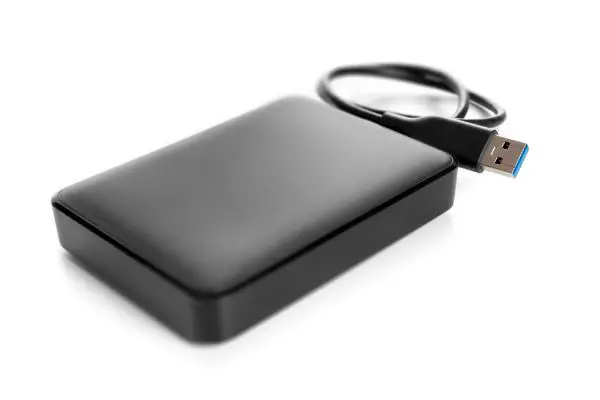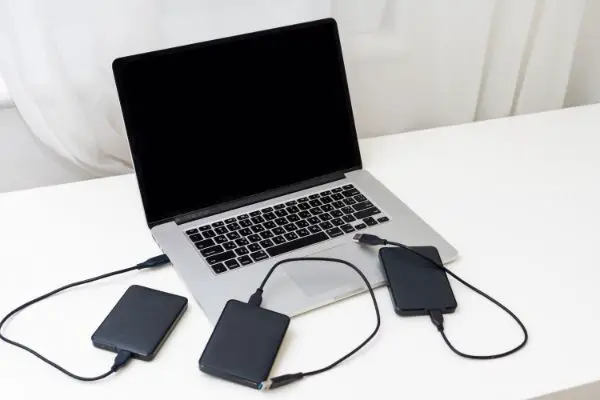Disclaimer: This post may contain affiliate links, meaning we get a small commission if you make a purchase through our links, at no cost to you. For more information, please visit our Disclaimer Page.
External hard drives are a great way to store extra data. However, there is some debate over whether or not they should be plugged in all the time.
Some people believe that it is better to unplug them when not in use, while others say that it is safe to leave them plugged in. In this blog post, we will explore both sides of the argument and help you decide what is best for you!
You should not keep an external drive fully powered and spinning to 100% when not in use as this will wear out the drive’s bearings and expose the drive to electrical surges, spikes and drops.
However, there are auxiliaries to this rule. Let’s explore them:
Table of Contents
Keeping Your External Plugged-In (Factors to Consider)
To decide whether or not to keep your external hard drive plugged in, there are a few factors to consider.
First, if you are using your external hard drive for backups, you will want to make sure that it is always plugged in so that your backups are up-to-date.
Second, if you have a lot of data on your external hard drive, it might be best to leave it plugged in so that you can access it quickly and easily.
Third, if you are using an external hard drive to store sensitive information, you will want to make sure that it is always plugged in for security reasons.
Unplugging Your External Hard Drive (Factors to Consider)
There are also a few factors to consider when deciding whether or not to unplug your external hard drive.
First, if you are not using your external hard drive regularly, you may want to unplug it so that you don’t accidentally overwrite any important files.
Second, if you have a lot of data on your external hard drive, you may want to unplug it so that it doesn’t overheat and damage your data.
Third, if you are not using an external hard drive for backups, you may want to unplug it so that you can use the extra space on your computer for other things.
So, should you keep your external hard drive plugged in? It really depends on how you are using it. If you are using it for backups or storing sensitive information, it is probably best to leave it plugged in.
However, if you are not using it regularly or have a lot of data on it, you may want to unplug it when not in use.
Is It Safe To Keep an External Hard Drive Plugged In? (5 Factors)
Most people don’t think twice about leaving their external hard drives plugged in when they’re not using them.
However, there are a few things you should know before doing this.
1. Hard Drive Design
External hard drives are designed to be plugged in and unplugged frequently.
They sometimes have a power switch on the back that you can toggle to turn them off when not in use. However, if you leave an external hard drive plugged in all the time, it will eventually wear out.
Hard drives are designed to stop spinning after a certain period of inactivity to save energy and prolong their lifespan.
Since all HDDs are designed for specific spin cycles. Leaving an external hard drive plugged in will cause it to spin continuously, which can lead to early failure.
2. HDD Enclosure’s Heat Dissipation Capability
HDD enclosures can generate a lot of heat when they are working hard.
If you have an external hard drive that is constantly plugged in, the enclosure will eventually get too hot and could damage your data.
Make sure your hard drive has a good enclosure that dissipates heat well.
You can also buy an external hard drive cooler to help keep your HDDs from overheating.
3. Auto-Spin Down
Most external hard drives have a feature called auto-spin down.
This means that the hard drive will spin down and enter a low power state when it is not being used for a certain period of time.
You can usually set this time period in the hard drive’s settings.
If you leave your hard drive plugged in all the time, it will eventually enter this low power state and could stay in this state for a long period of time.
This can lead to data loss or corruption.
4. Stability of USB Power Supply
External hard drives usually get power from a USB port.
If you leave your external hard drive plugged in all the time, the USB port on your computer could eventually fail.
This is because USB ports are not designed to supply constant power and can overheat or fail if too much power is drawn through them.
5. Safe Ejection of the HDD
If you unplug an external hard drive without properly ejecting it, you could corrupt the data on the drive.
Make sure to always safely eject your hard drive before unplugging it.
You can do this by clicking the Safely Remove Hardware icon in the Windows notification area or by using the Eject command in macOS.
What Are Some Issues of Having an External Hard Drive Plugged in All the Time?
There are several potential issues of having an external hard drive plugged in all the time.
1. Hard Drive Wear and Tear
If you have your external hard drive plugged in all the time, it can lead to wear and tear on the drive. Over time, this can cause your hard drive to fail sooner than it would if it were only used intermittently.
To avoid this issue, try unplugging your external hard drive when it’s not in use. This will help preserve its lifespan.
Alternatively, you could purchase an external hard drive that comes with a power switch so you can easily turn it off when not in use.
This is definitely something to consider if you plan to use your external hard drive frequently.
2. Data Corruption
Another issue of having an external hard drive plugged in all the time is data corruption.
Data corruption can occur when there is a sudden power loss while data is being written to the hard drive.
This can happen if you unplug your external hard drive without properly ejecting it first, or if there’s a power outage while it’s still plugged in.
To avoid this, make sure to always properly eject your external hard drive before unplugging it. This way, any data that was in the process of being written will be saved before the power is cut off.
You can also prevent data corruption by using a UPS (uninterruptible power supply) which will keep your devices powered even in the event of a power outage.
3. Security Risks
Another potential issue of having an external hard drive plugged in all the time is security risks.
If you leave your external hard drive plugged in, it provides an easy way for someone to access your data without having to physically enter your home or office.
All they would need is a way to connect to your external hard drive, which could be done wirelessly if you’re not careful.
To avoid this, make sure to encrypt your external hard drive so that only authorized users can access it. You can also unplug it and/or store it in a secure location when it’s not in use.
4. Overheating
Finally, another issue of having an external hard drive plugged in all the time is overheating.
If your external hard drive gets too hot, it can cause damage to the drive and/or data loss.
To avoid this, make sure to keep your external hard drive in a cool, dry place when not in use. You could also purchase a cooling dock for your external hard drive to help keep it from overheating.
5. Power Consumption
Another potential issue of having an external hard drive plugged in all the time is power consumption.
External hard drives can consume a fair amount of power, even when they’re not in use.
This can cause your energy bills to increase, and it’s not great for the environment either.
To avoid this, you could unplug your external hard drive when it’s not in use or purchase a model that comes with an auto-off feature. This way, your hard drive will automatically shut off when not in use, saving you both money and energy.
6. Noise
Finally, another issue of having an external hard drive plugged in all the time is noise.
External hard drives can be quite loud when they’re working, and this can be disruptive if you’re trying to work or sleep nearby.
7. Limited Lifespan
Finally, another potential issue of having an external hard drive plugged in all the time is a limited lifespan.
External hard drives are not meant to be always on and can wear out sooner if they’re constantly powered up.
To avoid this, try unplugging your external hard drive when it’s not in use. This will help preserve its lifespan.
Alternatively, you could purchase an external hard drive that comes with a power switch so you can easily turn it off when not in use.
This is definitely something to consider if you plan to use your external hard drive frequently.
Another option is to consider having another hard drive with your important data as a backup in case the current one fails.
Overall, it’s important to weigh the pros and cons of having an external hard drive plugged in all the time before deciding.
If you plan to keep it plugged in, be sure to take the necessary precautions to protect your data and prevent any potential issues.
The Bottom Line
Should you keep your external hard drive plugged in? It depends.
If you’re using it frequently, it may be worth leaving it plugged in so you don’t have to constantly unplug and replug it.
However, if you’re not using it often, or if you’re worried about any of the potential issues mentioned above, you could unplug it when not in use.
Ultimately, the decision is up to you. Just be sure to weigh the pros and cons carefully before making a decision.


